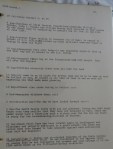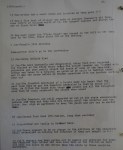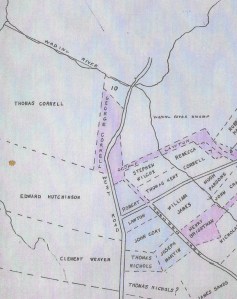The Portsmouth Community Theater is rehearsing for a performance of “The Ghostly Witness” Sunday (Sept. 8) , at 4 PM at the Portsmouth Historical Society Museum. The actors appreciate knowing more about he characters they portray.
Henry Strait
Henry Strait might have been about 21 at the time of the trial. He boarded with the Cornells, but he was the apprentice of Greshom Woddell and was learning to be a wheelwright. He was from Wales and when he was 15 he came to Rhode Island under contract to Woddell. That was how he paid his way to America. He was obligated to Woddell for six years work. He could not write, but he did seem to have the ability to speak with the Native Americans in the area. Strait was one of the first to come into Rebecca’s room after the fire and his testimony contradicted Thomas Cornell Jr. about Rebecca not eating with them when they had salted mackerel.
Sarah Cornell

Denise Betz as Sarah Cornell rehearses with Ron Marsh who portrays Thomas Cornell
Sarah Earle Cornell grew up in a affluent family in the household of her father, Ralph Earle. That household would have had servants to help the women with their work at home and in the garden. After her marriage to Thomas Cornell, Jr, she was the only able bodied woman in the household and would have milked cows, picked berries and fruit, tended the garden as well as tended to the indoor chores of cooking, cleaning and washing. Her testimony alone put a potential murder weapon in Thomas’ hand.
Sarah was the second wife of Thomas, so she entered marriage with a full household, Thomas, his four sons and Rebecca. Sarah had two daughters with Thomas and was pregnant with the third daughter at the time of the trial. She named that child “Innocent” and this daughter was an ancestor of Lizzie Borden.
Thomas’ younger brother William advocated for Sarah to stand trial in 1675 even though Thomas had already been tried, found guilty and hanged. Some thought that Sarah was a co-conspirator because another person said they overheard a conversation between Thomas and his wife. The couple promised that “If you will keep my Council, I will keep yours.” Sarah was indicted and stayed in prison while awaiting trial. She was found “not guilty”.
She was remarried to a man named David Lake and had more children with him.
Mary Cornell
Mary was the daughter in law of Rebecca Cornell, the wife of John Cornell. Her father was John Russell. His testimony, along with that of John Briggs, helped re-open the Cornell case. John Russel said that a friend reported a conversation in which Rebecca showed fear of her son Thomas and wanted to leave his home. Mary lived in the Dartmouth area and her testimony centered around how Rebecca believed that her son Thomas neglected her.
Rebecca Woolsey
Rebecca was one of the older children of Thomas Cornell, Sr and Rebecca. After the rest of the family came home from the Bronx after the massacre of the Hutchinson family, Rebecca stayed in New York. Her testimony was given by deposition in Flushing, New York. Rebecca Woolsey’s testimony added another possibility – that her mother had some suicidal thoughts.






